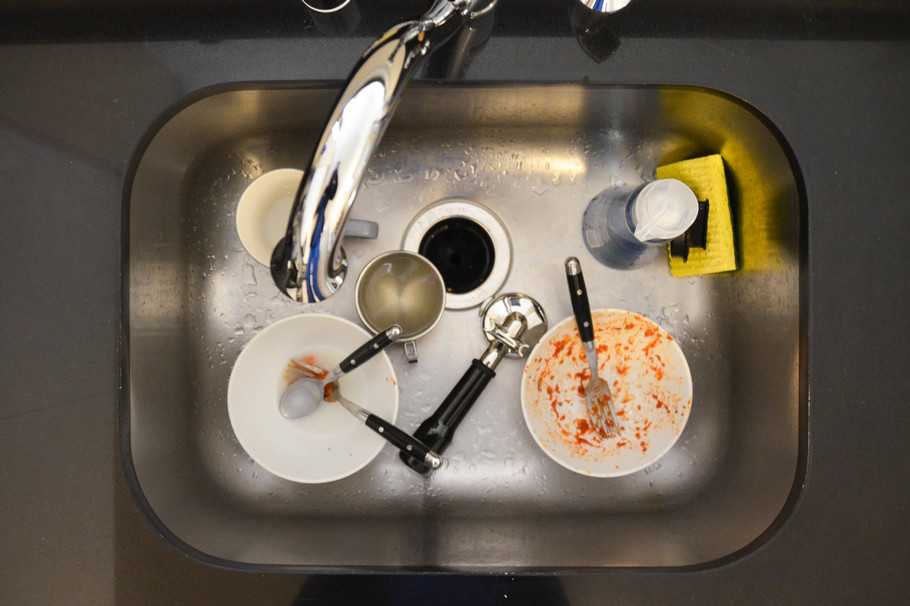I know we are all guilty of some, if not all, of these sanitary kitchen mistakes. While they seem like a lot to remember, the more you break the bad habits, the more your health will thank you.

1. Cutting Board Etiquette
I know that not everybody is Beyoncé and can afford a cutting board for each type of food (meat, poultry, fish, vegetables, etc.). I am on a college budget myself, but I always clean my cutting boards thoroughly and try my best to disinfect cutting boards that have held raw meat when I can. When disinfecting my plastic cutting boards, I use 1 teaspoon of bleach mixed with 1 quart of water. Next, I soak the boards in this mixture for at least 2 minutes and then rinse them with hot water. This first tip will help you avoid cross contamination and keep you happy and healthy enough to go to class every day (okay, maybe not so happy about waking up for that 8 AM, but at least healthy).

2. Dishes
As I said before, I am not Beyoncé (unless you put on “I Care” while I’m in the shower, then I might turn into Sarah Fierce). Throughout my time in dorms and even now, I have not had the luxury of a dishwasher. Something that I cannot go without, however, is my handy dandy drying rack. It is important that, after hand washing dishes, you do not put wet dishes away in your cabinets. This can cause bacteria to grow on the very surfaces that you use to eat food! If you are hand drying your dishes, you run the risk of either wasting money on paper towel usage or drying dishes with unsanitary hand towels that can spread germs. So, tip #2, get a drying rack for your dishes!

3. Dish Towels
With that being said, dish towels are a great kitchen staple, if used correctly. If you are like me and the moms of the world, you keep your dish towel hanging on the cabinet hook below your sink or over the oven handle. You reach for it anytime there is the slightest amount of liquid on your hands. This habit can cause your dish towels to be one of the most bacteria-ridden items in your kitchen, thereby leading to a contamination frenzy around the room as you go from touching the towel to the rest of the kitchen surfaces. To prevent this, reserve your kitchen towels for drying clean dishes or hands only. Put your dish towels in the wash as often as possible and use paper towels when needed for any other kitchen job.

4. Rotting Food
I know it is hard to keep up with the food in your fridge when you’re busy trying to keep up with your classes, your laundry, and even the Kardashians, but, like all of those, keeping track of your food is a necessary evil. Rotting food in your fridge can cause bacteria and mold to grow not only on that piece of food, but also on any uncovered food in your fridge. Make sure that you are aware of what is in your fridge, know how long each item has been there, and seal each item well before putting it into your fridge. Lastly, use leftovers in creative ways or as a quick lunch during the week. Not only will this help you be more spontaneous in the kitchen, but it will save you from spending money on campus anytime you pass by that Chick-Fil-A in the cafeteria.

5. Defrosting
Buying frozen meat and vegetables is a great way to stay on budget when food shopping. If you’re like me, there are nights when I originally planned on cooking, but the busyness of class and work leaves me too exhausted to fire up the stove and make myself something. Buying frozen items allows me to not worry that food will go bad if I don’t cook it fast enough. That being said, defrosting is an important task that has some safety risks. The best and safest way to defrost meat is by putting it in a bowl and covering it or sealing it as tightly as you can, and leaving it in the fridge over night. If this is not an option (I know it takes forever), my preferred method of defrosting is the microwave. While this is a great, fast method, you have to keep an eye on it, and flip it half-way through to prevent it from cooking.

6. Microwave Etiquette
While we’re on the topic, your microwave is another health hazard. I know as college students, our microwaves become our best friends. But just like when our best friend has a little too much to drink, our microwaves need cleaning and love too. Microwaves can grow bacteria and mold if there are food particles, a lack of ventilation, or just due to condensation build up. Make sure the vents in your microwave are not being blocked by anything so they can adequately let steam escape. To prevent any food particles from building up, clean and disinfect the microwave regularly. Keep a pack of disinfecting wipes in a kitchen drawer close to your microwave so they’re easy to reach after you spill something.

7. Sponge Etiquette
As college students, we don’t have dishwashers and we definitely don’t have dishwashers with those fancy compartments for cleaning sponges. This is still no excuse to have one of those soaking wet sponges that you eventually refuse to touch for fear of the smelly juices dripping on you. With this in mind, always rinse and squeeze out your sponges after using them. Contrary to what we’ve learned from Spongebob, a dried-out sponge is a good sponge. Aside from wringing out your sponge, clean and disinfect your sponge about every week. You can use your handy dandy microwave by saturating your sponge in water and microwaving it for 1 to 2 minutes. You can also soak your sponge in bleach or vinegar to disinfect it before rinsing it out.

8. Marinating
Any cooking process that involves raw meat requires extra precaution. When it comes to marinating meat, make sure your marinade and meat are both contained and sealed. If you keep it in a bag, make sure you also put the entire bag on a plate to prevent leakage. It is always tempting, after making an amazing marinade, to use it as a sauce. It is also great because it means you’re not throwing away the leftover marinade (all of these small savings add up, trust me). BUT, be careful! This marinating liquid has been touching raw meat, so before you can use it as a delicious sauce, you must bring the mixture to a boil for at least 5 minutes to eliminate any potentially harmful bacteria.

9. Contamination
It may seem that each one of these safety hazards involves some level of contamination, but this is the root of many problems in the kitchen. Especially while working in small, dorm-sized kitchens, and being too busy (and let’s face it, too lazy) to clean dishes as fast as they should be cleaned, it is essential to know ways to best prevent contamination. I know we all crack eggs, get some egg white on our hands, and simply rinse off our hands. We’ve all been there, but we need to support each other in the quest to end this monstrous behavior. Raw eggs can spread many different kinds of bacteria and make you sick, so always thoroughly wash your hands after touching raw eggs or any other raw animal products. Lastly, your kitchen itself wants to be clean, not just the dishes and utensils in your kitchen. I’m hoping you’ve learned this by now, but the 5-second rule is not a thing. So, clean your kitchen floors enough to be able to eat off of them, but just because you can, doesn’t mean you should.

10. Phone usage
We as a generation have the incredible fortune of being attached to a device that can do virtually anything with the touch of a finger. But, while our phones do amazing things inside and outside of the kitchen, they are also victims of bacteria and germs. I love using recipes from my phone or listening to music from my phone while I’m cooking. Because we keep our phones on us at all times, if our phones get contaminated, we will carry those germs with us everywhere we go. If you want to have your phone with you, try to keep it in your pocket as much as possible or keep it on a different surface than the one you are working on or cooking near. The less you can touch your phone with dirty hands or with food particles, the less likely you are to spread germs and bacteria.



